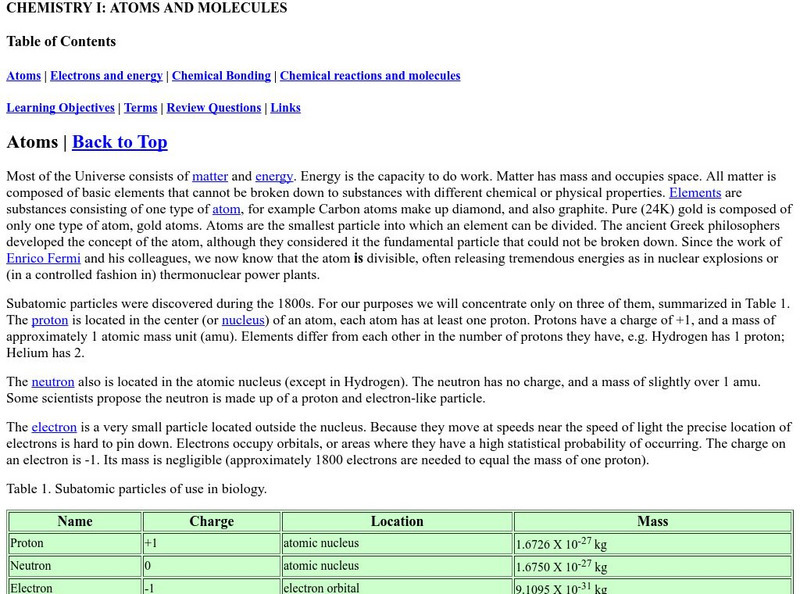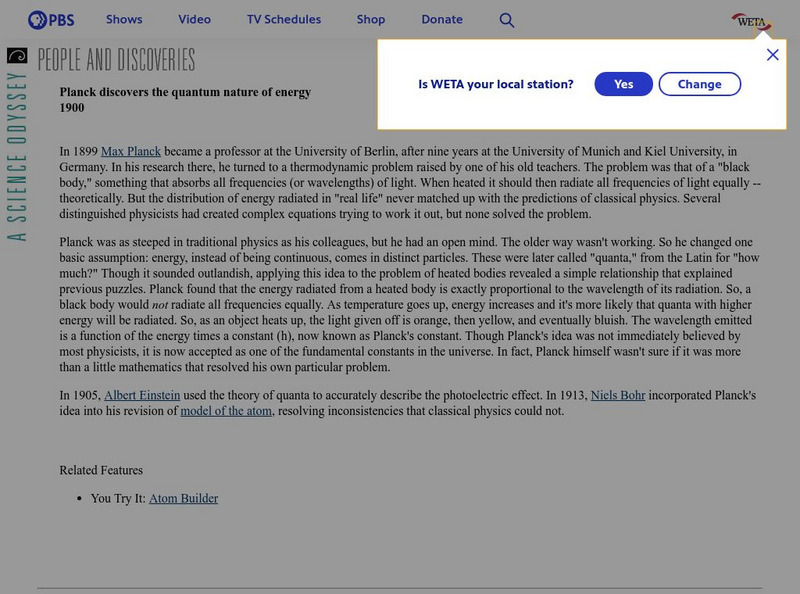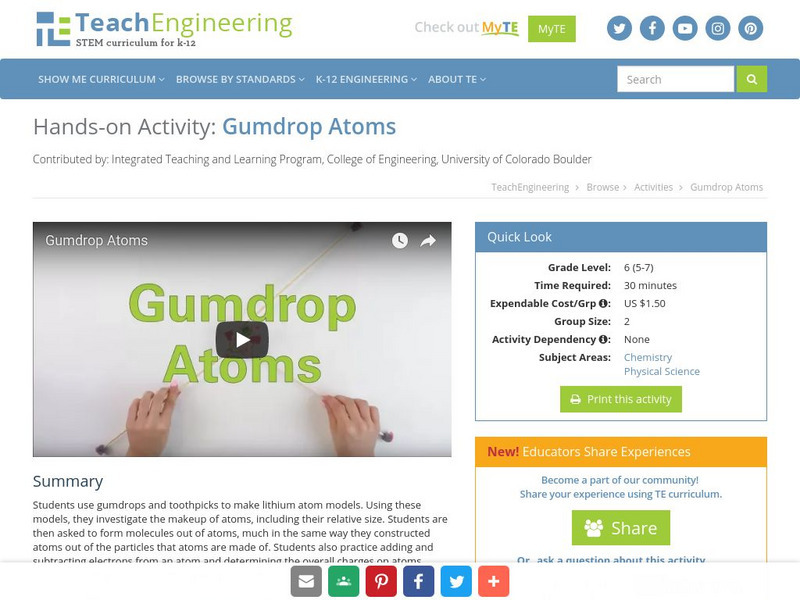Hi, what do you want to do?
Environmental Chemistry
Periodic Table of Elements: Gallium
A very detailed look at the element Gallium, a member of the Boron Group.
Environmental Chemistry
Periodic Table of Elements: Indium
A very detailed look at the element Indium, a member of the Boron Group.
Environmental Chemistry
Periodic Table of Elements: Thallium
A very detailed look at the element Thallium, a member of the Boron Group.
Estrella Mountain Community College
Online Biology Book: Chemistry I: Atoms and Molecules
In this online biology textbook, learn about atoms and molecules as they relate to life. Find out about topics such as electrons and energy, chemical bonding, and chemical reactions.
Upper Canada District School Board
Tom Stretton's Chemistry Pages: The Nucleus
This online slide show presents the basic ideas behind the structure of the atomic nucleus.
PBS
Pbs: Planck Discovers the Quantum Nature of Energy
PBS offers a short summary of the discovery of the quantum nature of the atom by Max Planck. Easy to follow.
Science Education Resource Center at Carleton College
Serc: Drawing Atoms
This activity serves as an introduction to chemistry, and can be used to help students draw a two dimensional image of the atom.
Science Education Resource Center at Carleton College
Serc: Properties of Electrostatic Charge: Interactive Lecture Demonstration
Students will investigate the properties of charge, charge by contact, the polarization of charge, and charge by induction. Through the use of demonstrations, students should have a thorough understanding of the movements of electrons...
TED Talks
Ted: Ted Ed: The Invisible Motion of Still Objects
Ran Tivony describes how and why molecular movement occurs and investigates if it might ever stop. [4:44]
Open Curriculum
Open Curriculum: The Atom
Learn about atoms and their properties of motion with this illustrated article.
TeachEngineering
Teach Engineering: Gumdrop Atoms
In this activity, students make a model of a lithium atom using gumdrops and toothpicks. Using this model, they investigate the makeup of an atom, including its relative size. Students also practice adding and subtracting electrons from...
Other
Swiss Federal Institute of Technology: Pauli's Principle
Provides information concerning Wolfgang Pauli's Exclusion Principle. Contains the periodical table of elements.
Sophia Learning
Sophia: Valence Electrons and Core Electrons
Through a series of slide show presentations and a video lesson, strengthen your understanding of valence electrons. [2:46]
California State University
Csudh Project for Chemistry: Protons, Electrons, and Neutrons
This page is an exercise in relating the number of protons, electrons, and neutrons for an atom or monoatomic ion.
CK-12 Foundation
Ck 12: Physical Science for Middle School
This digital textbook covers core physical science concepts and includes interactive features, real world examples, and videos.
CK-12 Foundation
Ck 12: Chemistry for High School
This digital textbook covers core chemistry concepts and includes interactive features, real-world examples, and videos.
Concord Consortium
Concord Consortium: How Does an Object Become Charged?
Activity 2 in this module examines How do objects become charged? An investigation of where the electrons come from and where they go, when atoms become charged.
Concord Consortium
Concord Consortium: What Are Nature's Building Blocks?
Activity 1 of this module explores What are the particles that make up all substances, and how small are they? A history of the atom is included.
Concord Consortium
Concord Consortium: Where Does All the Energy in an Explosion Come From?
In this module Activity 2 investigates What happens to atoms during a chemical reaction? In this activity students explore chemical reactions and develop a model to explain observations of chemical reactions.
Concord Consortium
Concord Consortium: Where Does All the Energy in an Explosion Come From?
Students construct a model of chemical reactions involving energy and electrostatic interactions and compare reactions and changes in energy through the following activities. Activity 1 What energy changes occur during an explosion?...
Concord Consortium
Concord Consortium: How Can a Small Spark Start a Huge Explosion?
In this module Activity 4 investigates How are bonds formed and broken? This activity explores the relationship between energy and the formation and breaking bonds, using the ideas of energy transfer and conversion.
Concord Consortium
Concord Consortium: How Can a Small Spark Start a Huge Explosion?
In this module Activity 3 investigates When atoms get close to each other, what happens to their potential energy? This activity applies energy concepts to compare the potential energy of atoms that are bonded as molecules with the...
Corrosion Source
Corrosion Source: Erbium
This site, which is provided for by Corrosion Source, gives a summary of basic physical data on erbium. This is a great site to check out for information on the subject.
Lawrence Berkeley National Laboratory
Berkeley Lab: Basic Nuclear Science Information
Site provides the ABC's of nuclear science including radioactivity and gamma decay to fission and comic rays.
Other popular searches
- Atomic Structure Time Line
- Atomic Structure Crossword
- Atomic Structure Lesson Plan
- Atomic Structure Worksheet
- Basic Atomic Structure
- Atomic Structure Bohr Model
- Atomic Structure Interactive
- Chemistry Atomic Structure
- Atomic Structure Lewis Dots
- The Atomic Structure
- Atomic Structure Activities
- Science, Atomic Structure
















